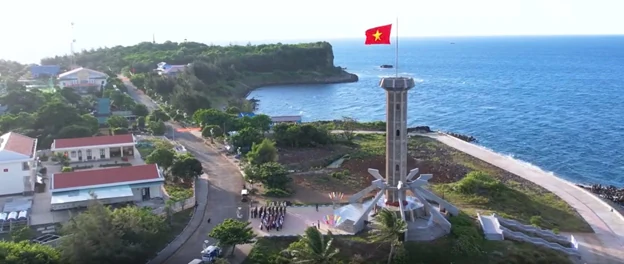{title}
{publish}
{head}
Con Co is a frontline island of Vietnam, located in the waters of Quang Tri province. With a strategic position, it serves as a national outpost safeguarding territorial sovereignty. The island lies 13 nautical miles from the mainland at its closest point.
During the Nguyen Dynasty, the imperial court named and utilized the island for specific purposes. Con Co was also known by other names such as Hon Co, Con Ho, or Hon Me — the latter used by fishermen from Vinh Linh district, Quang Tri province. The island covers a natural area of 230.39 hectares. Historical records indicate that as early as the 17th and 18th centuries, Con Co served as a stopover point on trade and communication routes of the Dai Viet people.

A corner of Con Co Island. Photo: K.N
According to official Nguyen Dynasty records, the island was called Thao Du (草嶼) during their reign. In Sino-Vietnamese, “Thao” means grass or vegetation, and “Du” refers to a small island. Situated off the coast of Cua Tung, the name likely reflected the island’s natural features, and under the reigns of Emperor Minh Mang and Emperor Thieu Tri, locals commonly referred to it as Hon Co (Grass Island).
Under the Nguyen feudal regime, the island was used to exile serious criminals. The “Dai Nam Thuc Luc Chinh Bien – Volume Three,” pages 26 and 27, records:
“Tan Su, the first year of Thieu Tri’s reign (1841), spring, first lunar month. The Ministry of Justice compiled a list of prisoners sentenced to military service or exile. The list detailed who should be retained or pardoned and submitted it to the emperor.
The emperor decreed: This newly granted clemency is not like ordinary pardons; it should, in principle, be applied uniformly. However, due to unresolved banditry in Tran Tay, previous releases of prisoners for military deployments are still in effect and must be reassessed once the conflict is resolved. As for descendants of the Le Dynasty, they were previously resettled from Quang Nam southwards and granted money and land — a benevolent act by the late emperor to provide peace and livelihood in segregated areas. Since they have now settled, they should not be moved again.
The people of Son Am, originally Khmer, had been relocated to a border area and now live peacefully. As for prisoners confined to Thao Du (Hon Co), they are either murderers or rebel leaders who surrendered. Releasing them entirely would be a misfortune for law-abiding citizens. The Ministry of Justice recommends maintaining the current arrangement, which is considered appropriate.”
The Nguyen Dynasty affirmed sovereignty over Thao Du (Hon Co). The island was directly mentioned by Nguyen emperors in court discussions, indicating its significance. It is likely that its isolated, offshore location was strategically chosen to confine dangerous criminals.
Con Co district was officially established under Decree No. 174/2004/ND-CP dated October 1, 2004, based on Con Co Island, previously part of Vinh Quang commune. Today, the island holds critical importance in Vietnam’s national defense strategy. Con Co functions as a military stronghold and an outpost overlooking the East Sea. In the heroic history of Quang Tri province, Con Co stands as a shining symbol of Vietnam’s revolutionary heroism — an unyielding monument in the sea, a frontline shield affirming the nation’s maritime sovereignty and territorial integrity.
During the resistance war against the United States, Con Co Island was dubbed “the divine eye” and "the unsinkable battleship at sea." The unit tasked with defending Con Co was twice awarded the title Hero of the People’s Armed Forces. Recognizing the island’s position and importance, the soldiers of the Con Co Border Guard Station (under the Quang Tri Provincial Border Guard Command), wearing green uniforms, have been working tirelessly day and night. In solidarity with local authorities and the island’s residents, they remain steadfast on this frontline outpost, holding firm to the sea and the land to safeguard national sovereignty and border security.
Con Co Border Guard Station was officially established by the Ministry of National Defense on November 20, 1997, under the designation Station 214, operating directly under the Quang Tri Provincial Border Guard Command. In its early days, the station’s officers and soldiers faced countless difficulties and shortages, lacking proper housing and even access to clean water.
In those challenging conditions, the green-uniformed soldiers had to simultaneously carry out two critical tasks: organizing the defense of the island while building barracks to establish stable living quarters. Over time, with support and guidance from higher authorities, the leadership of the Con Co Border Guard Station proactively overcame hardships, steadily building a fully capable and resilient unit. The station has since excelled in its missions, including safeguarding maritime sovereignty, ensuring island security, and engaging in search and rescue operations.
Recognizing the strategic position and critical importance of this frontline island, the station has proactively developed plans and implemented border management and defense tasks. They maintain a firm grasp of the situation to prevent any surprises or unpreparedness. Particular emphasis is placed on conducting regular patrols and surveillance to protect the sovereignty and security of the sea and island areas, while also detecting, confronting, and promptly halting incursions and illegal fishing activities by foreign vessels.
Several centuries ago, the Nguyen court used the name Thao Du in official governance. This designation likely laid the foundation for the more Vietnamese names that followed — Hon Co, and now, Con Co.
Khac Nien - Ngoc Mai

QTO - The events aim to promote a culture of exercise and competitive sports, while also showcasing the province’s tourism potential and strengths.

QTO - In July, the central province of Quang Tri welcomes people from all parts of the country who silently come to this land to pay their tribute to...